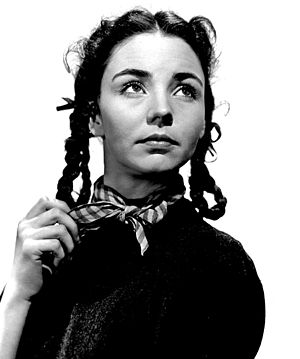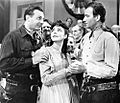Jennifer Jones facts for kids
Quick facts for kids
Jennifer Jones
|
|
|---|---|
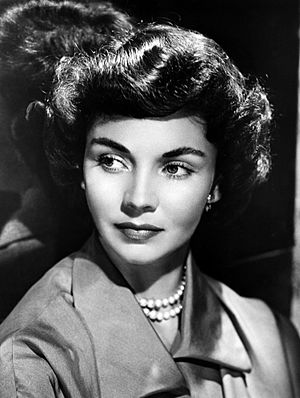
Jones in 1953
|
|
| Born |
Phylis Lee Isley
March 2, 1919 Tulsa, Oklahoma, U.S.
|
| Died | December 17, 2009 (aged 90) Malibu, California, U.S.
|
| Resting place | Forest Lawn Memorial Park, Glendale, California, U.S. |
| Alma mater | Northwestern University American Academy of Dramatic Arts |
| Occupation | Actress |
| Years active | 1939–1974 |
| Spouse(s) |
Robert Walker
(m. 1939; div. 1945) |
| Children | 3, including Robert Walker, Jr. |
Jennifer Jones (born Phylis Lee Isley; March 2, 1919 – December 17, 2009) was a talented American actress. She was also known as Jennifer Jones Simon. Over her long career, which lasted more than 50 years, she was nominated for five Oscars. She won one Oscar for Best Actress and also a Golden Globe Award for Best Actress in a Drama film.
In 1980, Jennifer started the Jennifer Jones Simon Foundation. This foundation helps people learn about and support mental health. She lived a quiet life in retirement. She spent her last six years in Malibu, California, where she passed away peacefully at age 90.
Contents
About Jennifer Jones
Her Early Life and Family
Jennifer Jones was born Phylis Lee Isley in Tulsa, Oklahoma, on March 2, 1919. Her parents, Flora Mae and Phillip Ross Isley, were both actors. They owned and ran a traveling "tent show" that toured the Midwest. Jennifer was their only child. She often joined her parents on stage as part of their acting company.
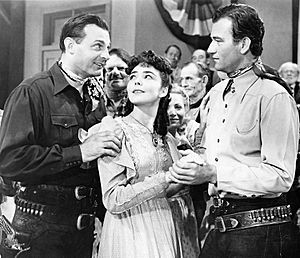
Jennifer went to school in Oklahoma City and then attended Monte Cassino, a Catholic girls' school in Tulsa. After graduating, she studied drama at Northwestern University in Illinois. Later, she moved to New York City to attend the American Academy of Dramatic Arts. It was there that she met and fell in love with another acting student, Robert Walker. They got married on January 2, 1939.
After their wedding, Jennifer and Robert moved to Hollywood. Jennifer got two small roles in movies in 1939. She appeared in the Western film New Frontier with John Wayne. She also acted in a serial called Dick Tracy's G-Men. In both films, she was credited by her birth name, Phylis Isley.
Becoming a Star Actress
Jennifer and Robert had two sons, Robert Jr. and Michael. While Robert found work in radio, Jennifer worked as a model. She modeled hats and posed for magazines like Harper's Bazaar. She was also looking for acting jobs.
In 1941, she auditioned for a play. Even though she thought she did poorly, a famous producer named David O. Selznick was impressed. He signed her to a seven-year contract. He also gave her a new name: Jennifer Jones.
Jennifer was carefully prepared for stardom. Director Henry King was very impressed by her audition for the movie The Song of Bernadette (1943). She won the main role of Bernadette Soubirous, beating hundreds of other actresses. In 1944, on her 25th birthday, she won the Academy Award for Best Actress for this role. It was only her third movie!
Jennifer also became romantically involved with producer David O. Selznick. She separated from Robert Walker in 1943 and they divorced in 1945. She even co-starred with Robert in the movie Since You Went Away (1944). For her performance in that film, she was nominated for her second Oscar, this time for Best Supporting Actress. She received another Oscar nomination for her role in Love Letters (1945).
Marriage to David O. Selznick
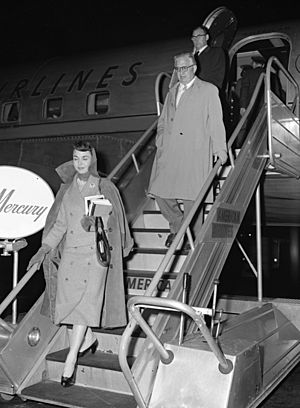
Jennifer married David O. Selznick on July 13, 1949. They were on a ship heading to Europe. For the next two decades, she starred in many films that he produced.
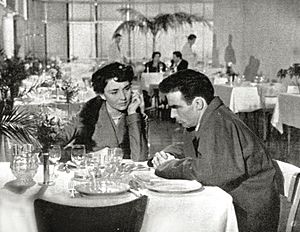
Jennifer played a Chinese-born doctor in the drama Love Is a Many-Splendored Thing (1955). This role earned her fifth Academy Award nomination. She then starred as a schoolteacher in Good Morning, Miss Dove (1955). After that, she played a lead role in The Man in the Gray Flannel Suit, a drama about a World War II veteran.
In 1957, she played the poet Elizabeth Barrett Browning in The Barretts of Wimpole Street. She also starred in A Farewell to Arms (1957). Her next movie was Tender Is the Night (1962).
Later Life and Activities
David O. Selznick passed away in 1965. After his death, Jennifer mostly stopped acting.
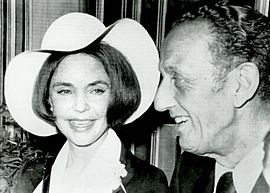
On May 29, 1971, Jennifer married her third husband, Norton Simon. He was a very wealthy businessman and art collector. Their wedding took place on a tugboat off the English coast. Jennifer's last film role was in the disaster movie The Towering Inferno (1974). Her performance in this film earned her a Golden Globe nomination for Best Supporting Actress.
Jennifer spent the rest of her life away from the public eye. Before her husband Norton Simon died in 1993, he made Jennifer the chairman of the board of trustees for the Norton Simon Museum in Pasadena, California. She was also the president and executive officer. She worked with famous architect Frank Gehry to improve the museum and its gardens. She remained active at the museum until 2003.
Personal Life
Jennifer Jones was a very private person. She often felt shy and did not like to talk about her past or personal life with reporters. She also avoided discussing what critics thought of her acting.
Her Final Years

Jennifer lived a quiet retirement. For her last six years, she lived with her eldest son, Robert Walker Jr., and his family in Malibu. Her younger son, Michael Ross Walker, passed away in 2007.
Jennifer made a few public appearances in her later years. She attended Gregory Peck's award ceremony in 1989. She also appeared at the 70th (1998) and 75th (2003) Academy Awards to honor past Oscar winners. In her last six years, she did not give interviews and rarely appeared in public. She passed away peacefully on December 17, 2009, at the age of 90. Her ashes were placed with her second husband, David O. Selznick, at the Forest Lawn Memorial Park in Glendale, California.
A small planet, 6249 Jennifer, was named in her honor.
Awards and Nominations
Jennifer Jones won several important awards during her career.
Academy Awards
| Year | Category | Work | Result |
|---|---|---|---|
| 1944 | Best Actress | The Song of Bernadette | Won |
| 1945 | Best Supporting Actress | Since You Went Away | Nominated |
| 1946 | Best Actress | Love Letters | Nominated |
| 1947 | Duel in the Sun | Nominated | |
| 1956 | Love Is a Many-Splendored Thing | Nominated |
Golden Globe Awards
| Year | Category | Work | Result |
|---|---|---|---|
| 1944 | Best Actress – Motion Picture Drama | The Song of Bernadette | Won |
| 1975 | Best Supporting Actress in a Motion Picture | The Towering Inferno | Nominated |
Images for kids
See also
 In Spanish: Jennifer Jones para niños
In Spanish: Jennifer Jones para niños
 | Lonnie Johnson |
 | Granville Woods |
 | Lewis Howard Latimer |
 | James West |


